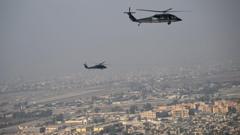Concerns are mounting over the significant military presence in Los Angeles as the federal government intervenes in local protests regarding immigration raids, inciting a dialogue about civil liberties and the limits of presidential power.
U.S. Military Presence in Los Angeles Sparks Controversy

U.S. Military Presence in Los Angeles Sparks Controversy
The deployment of troops amid protests raises concerns over military engagement on U.S. soil.
In a rare display of military force on U.S. soil, approximately 4,000 National Guard members and 700 Marines are currently stationed in downtown Los Angeles. This unprecedented move has been prompted in response to ongoing protests triggered by controversial immigration raids. California Governor Gavin Newsom has publicly condemned the action on social media, asserting that President Trump's decision to deploy troops is an attempt to turn the military against American citizens. He has called for an emergency court order to limit the troops' role to protecting federal properties alone.
President Trump has defended the deployment, claiming that without federal intervention, Los Angeles would be overwhelmed by chaos. Military deployments, while not uncommon for natural disasters or local emergencies, typically involve coordination with state governors. According to experts, his administration's approach is straining legal boundaries. "Active duty forces are generally prohibited from engaging in domestic law enforcement unless the Insurrection Act is invoked," noted Pentagon correspondent Helene Cooper. She questioned the justification for employing military force, given the limited scope of protests in the city.
Journalist Jesus Jiménez, who is on the ground in Los Angeles, reported that the demonstrations are confined to a modest area of downtown, largely concentrated around federal buildings rather than encompassing the city at large. As the situation evolves, both state and national leaders grapple with the implications this military presence may have on civil rights and governance.
President Trump has defended the deployment, claiming that without federal intervention, Los Angeles would be overwhelmed by chaos. Military deployments, while not uncommon for natural disasters or local emergencies, typically involve coordination with state governors. According to experts, his administration's approach is straining legal boundaries. "Active duty forces are generally prohibited from engaging in domestic law enforcement unless the Insurrection Act is invoked," noted Pentagon correspondent Helene Cooper. She questioned the justification for employing military force, given the limited scope of protests in the city.
Journalist Jesus Jiménez, who is on the ground in Los Angeles, reported that the demonstrations are confined to a modest area of downtown, largely concentrated around federal buildings rather than encompassing the city at large. As the situation evolves, both state and national leaders grapple with the implications this military presence may have on civil rights and governance.






















